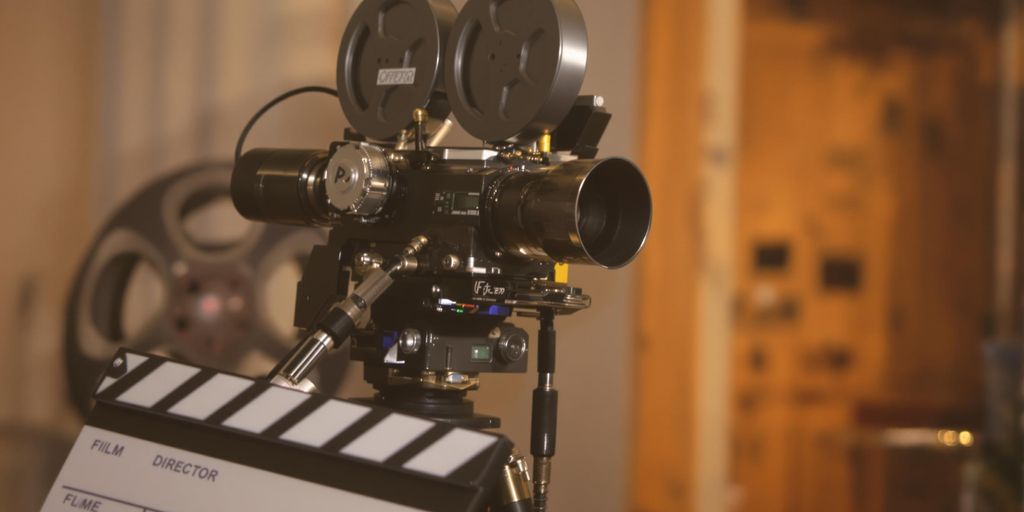Getting a job in filmmaking can be tough because lots of people want to do it. Your resume needs to stand out and show what you can really do. It’s not just about listing old jobs; it’s about showing off your best projects and skills in a way that makes sense to hiring managers. This article gives you 11 Filmmaker Resume Examples to help you get hired in 2025.
Key Takeaways
-
Make sure your resume is easy to read and only includes the most important information.
-
Show off your best work with specific examples, like how many people were on your team or what the project earned.
-
Always change your resume a bit for each job you apply for, so it matches what they are looking for.
-
Don’t forget to list the software and tools you know how to use, like editing programs.
-
Even if you’re new, focus on any related experience or personal projects you have done.
1. Senior Filmmaker
When you’ve been in the film industry for a while, your resume needs to show it. It’s not just about listing jobs; it’s about showing the impact you’ve had. Think of it as a highlight reel of your best work. Let’s get into what makes a senior filmmaker resume stand out.
First off, quantifiable achievements are your best friend. Instead of saying you “managed a team,” say you “led a team of 15 to deliver a project 20% under budget.” Numbers speak volumes. Also, focus on the types of projects you’ve led. Did you work on indie films, big-budget productions, or documentaries? Tailor your resume to the specific type of role you’re after. If you’re aiming for a job in a documentary, highlight your documentary experience, even if you’ve done other types of film work.
Here are a few things to keep in mind:
-
Showcase Leadership: Highlight instances where you led teams, mentored junior staff, or made key decisions that impacted the project’s success.
-
Quantify Results: Use numbers to demonstrate your impact. For example, “Increased viewership by 30% through strategic marketing campaigns.”
-
Tailor to the Role: Customize your resume for each application, emphasizing the skills and experiences most relevant to the specific job.
A senior filmmaker’s resume should tell a story of growth, leadership, and significant contributions to the film industry. It’s about showing not just what you’ve done, but how well you’ve done it and the positive impact you’ve had.
Consider adding a section for awards and recognition. If you’ve won any awards, even small ones, list them. It adds credibility. Also, include a portfolio or a link to your online reel. This allows potential employers to see your work firsthand. Finally, make sure your resume is easy to read. Use clear headings, bullet points, and a professional font. A cluttered resume can be a turn-off, no matter how impressive your experience is. If you need help, consider using an AI resume builder to streamline the process.
2. Junior Filmmaker
So, you’re past the entry-level stage and have some film experience under your belt? Great! A junior filmmaker resume needs to show that you’re ready to take on more responsibility and contribute meaningfully to projects. It’s about highlighting your skills and demonstrating how you’ve grown since you started.
Your resume should clearly show your progression and increasing competence.
Here’s what to keep in mind:
-
Showcase specific projects you’ve worked on and your role in each. Don’t just list the film title; describe what you did.
-
Quantify your achievements whenever possible. Did you help reduce editing time by a certain percentage? Did your work lead to positive reviews? Numbers speak volumes.
-
Tailor your resume to each job application. Read the job description carefully and highlight the skills and experiences that match what the employer is looking for. Use audio engineer resume examples to get inspired.
Remember, a junior filmmaker resume is about demonstrating your potential and showing that you’re ready to take the next step in your career. It’s about proving that you’re not just an assistant anymore, but a valuable member of the team.
Think about including these sections:
-
A strong summary or objective statement that highlights your key skills and career goals.
-
A detailed work experience section that showcases your accomplishments and responsibilities.
-
A skills section that lists both technical and soft skills relevant to filmmaking.
Don’t forget to proofread carefully! A typo or grammatical error can make you look unprofessional. Consider using a tool like RoboApply to help you optimize your resume and cover letter. Good luck!
3. Aspiring Filmmaker
So, you’re trying to break into the film industry? Awesome! An aspiring filmmaker resume is all about highlighting your potential and passion, even if you don’t have a ton of professional experience yet. Think of it as showcasing your raw talent and eagerness to learn. Let’s get into it.
Focus on what you do have: relevant coursework, film club involvement, personal projects, and any freelance gigs. Don’t be shy about listing transferable skills from other jobs, either.
Here’s how to make your resume shine:
-
Education is key: Put your film-related education front and center. List relevant courses, workshops, and certifications.
-
Showcase your projects: Even if they’re student films or personal projects, detail your role and contributions. Use action verbs to describe what you did (e.g., directed, edited, wrote).
-
Highlight your skills: List both technical skills (e.g., editing software, camera operation) and soft skills (e.g., teamwork, communication).
Remember, your resume is your first impression. Make it count by showcasing your passion, skills, and potential. Tailor it to each job you apply for, and don’t be afraid to get creative!
Think about including a portfolio or demo reel link if you have one. This gives potential employers a chance to see your work in action. Also, network, network, network! Attend film festivals, workshops, and industry events to meet people and learn more about the field. A strong network can open doors that a resume alone can’t.
Crafting a compelling finance resume is essential for landing your dream job. For aspiring filmmakers, it’s about showing your potential and passion. Even if you lack extensive professional experience, highlight relevant coursework, film club involvement, personal projects, and freelance gigs. Don’t hesitate to list transferable skills from other jobs. A well-structured resume can significantly boost your chances in the competitive film industry. Similarly, a standout marketing director resume can highlight strategic leadership and measurable outcomes.
4. Entry-Level Filmmaker
Landing your first gig in the film industry can feel like a huge challenge. Your resume is your chance to show potential employers that you’re ready to learn and contribute, even without extensive experience. Let’s look at how to make your entry-level filmmaker resume shine.
Focus on showcasing your skills, education, and any relevant projects you’ve worked on. Even if it’s just student films or personal projects, they demonstrate your passion and abilities.
Here’s what to keep in mind:
-
Highlight Technical Skills: List any software or equipment you’re familiar with, such as editing software (Adobe Premiere Pro, Final Cut Pro), camera operation, or sound recording equipment. These technical skills are super important.
-
Emphasize Education: If you have a film degree or have taken relevant courses, make sure to highlight them. Include any film-related workshops or seminars you’ve attended.
-
Showcase Projects: Include any film projects you’ve worked on, even if they were unpaid or for school. Describe your role and the skills you used. Use action verbs to describe your contributions.
Remember to tailor your resume to each specific job you’re applying for. Read the job description carefully and highlight the skills and experiences that are most relevant to the position. A generic resume won’t cut it.
Think about including a section for “Relevant Coursework” if you’re fresh out of school. This can help demonstrate your knowledge base even if you lack professional experience. Also, don’t forget to include a professional email for contact information.
5. Film Resume
Let’s talk about the film resume itself. It’s more than just a list of jobs; it’s a showcase of your skills and experience in the film industry. Think of it as your personal highlight reel, tailored to catch the eye of potential employers.
A well-crafted film resume can open doors to exciting opportunities. It’s your chance to demonstrate your passion, skills, and experience in a way that resonates with industry professionals.
To create a compelling film resume, consider these points:
-
Template Selection: Choose a clean and professional template. Simplicity is key; avoid overly flashy designs that distract from your content. A straightforward layout ensures your experience takes center stage.
-
Organize Film Credits: List your film credits in a clear, easy-to-read format. Include the project title, your role, and the year of completion. Be specific about your contributions to each project.
-
Highlight Qualifications: Emphasize your specific qualifications relevant to the film industry. This includes technical skills (e.g., camera operation, editing software), creative abilities (e.g., storytelling, directing), and soft skills (e.g., communication, teamwork).
-
Professional Activities: Include any professional film activities, such as film festivals attended, workshops completed, or industry memberships. These demonstrate your commitment and engagement in the film community.
Remember, your film resume is a living document. Update it regularly with your latest projects, skills, and achievements. Tailor it to each job application, highlighting the experience and skills most relevant to the specific role. A well-maintained and targeted resume significantly increases your chances of landing your dream job in the film industry. If you need to create a film resume, there are many resources available to help you get started.
6. Film Resumes by Experience
It’s important to tailor your film resume to your experience level. What works for a seasoned pro won’t necessarily work for someone just starting out. Let’s look at how to approach your resume based on how much experience you have.
Seasoned Filmmaker
If you’ve been in the film industry for a while, your resume needs to showcase your accomplishments. Focus on your most impressive achievements and quantify them whenever possible. Don’t waste space on irrelevant jobs or skills. A resume summary is better than an objective statement at this stage, giving you space to highlight your qualifications for the specific role.
Emerging Filmmaker
When you don’t have a ton of direct film experience, it’s all about highlighting transferable skills. Think about skills you’ve gained in other jobs or projects that could be relevant to filmmaking, like project management, communication, or technical skills. If you’ve completed any film-related projects, be sure to include them. A resume objective can be a great way to explain your career goals and how you plan to contribute to the film industry.
Skills to Include
Here are some skills that are often sought after in the film industry:
-
Video Editing
-
Sound Design
-
Cinematography
-
Production Planning
-
Motion Graphics (After Effects, Cinema 4D, Houdini)
Action Verbs
Use strong action verbs to describe your experience and accomplishments. Here are a few examples:
-
Directed
-
Created
-
Developed
-
Collaborated
-
Conducted
Remember to tailor your resume to each specific job you’re applying for. Carefully review the job description and highlight the skills and experience that are most relevant to the position. Don’t just repeat the job duties; focus on your accomplishments and how you made a positive impact.
By tailoring your acting resume templates to your experience level, you’ll increase your chances of landing your dream job in the film industry.
7. Film Resumes by Role
It’s important to tailor your resume to the specific role you’re applying for. A film editor’s resume will look different from a cinematographer’s. Highlight the skills and experience most relevant to the job description. Let’s look at some examples.
Film Editor Resume
Film editors need to showcase their technical skills and creative eye. Proficiency in editing software like Adobe Premiere Pro or Final Cut Pro is a must. Also, highlight your experience with different genres and project types.
-
Showcase experience with various editing software.
-
Quantify achievements (e.g., “Edited a film that won ‘Best Editing’ award”).
-
Include a portfolio or links to your work.
A strong film editor resume emphasizes both technical skills and artistic vision. It should clearly demonstrate your ability to tell a story through editing.
Cinematographer Resume
Cinematographers need to demonstrate their understanding of lighting, composition, and camera operation. Your resume should highlight your experience with different camera formats and shooting styles. Consider adding a professional header to make it easy for recruiters to contact you.
-
List specific camera equipment you’re proficient with.
-
Include examples of your work (e.g., a link to your demo reel).
-
Highlight experience with different lighting techniques.
Film Director Resume
A film director’s resume should showcase leadership, communication, and creative vision. Highlight your experience in managing teams, working with actors, and overseeing all aspects of production. It’s also important to show your ability to secure funding and negotiate contracts.
-
Emphasize your ability to manage budgets and schedules.
-
Showcase your experience in working with actors and crew.
-
Include a list of films you’ve directed and their achievements.
Production Assistant Resume
Even for entry-level roles like Production Assistant, tailoring your resume is key. Highlight your organizational skills, attention to detail, and willingness to learn. Any experience on set, even if it’s volunteer work, is valuable. Make sure your resume is easy to read and free of errors. A well-crafted resume can help you stand out, even with limited experience. Consider using a resume objective to lay out why you want the job.
-
Highlight any relevant coursework or training.
-
Showcase your ability to work long hours and under pressure.
-
Include any experience with administrative tasks or office software.
8. Write Your Film Resume
Crafting a film resume that lands you the job requires more than just listing your experience. It’s about showcasing your skills and passion in a way that resonates with potential employers. Let’s break down how to make your film resume shine.
It’s important that your resume shows why you are a good fit for a filmmaking job. You need to match your past work to what the new job asks for. Think about what you did before and how it can help in making films. Show you know the tools and tasks of the trade.
-
List editing software you’ve mastered, like Final Cut Pro or Adobe Premiere.
-
Point out projects where you led a team, stating the size like ‘managed a crew of 10’.
-
If you come from a different career, mention similar tasks like organizing events which is like planning a shoot.
Your resume is your first impression, so make it count. Tailor it to each specific job, highlighting the skills and experiences that are most relevant. Don’t just list what you’ve done; show how you’ve made a difference.
To create an effective film resume, highlight both soft and hard skills, and include your experience, education, awards, and affiliations. For example, you can add a filmography section listing your works. Include titles, your role, and any awards won. This provides a clear view of your contributions and achievements in the film industry. This guide provides seven pilot resume examples and expert advice for 2025. It emphasizes the importance of a well-written resume to highlight skills, experience, and qualifications in the competitive aviation job market. Key tips include crafting a clear, tailored objective statement for aviation roles, with tools like AI resume builders recommended for optimization.
9. Filmmaker
Being a filmmaker is more than just pointing a camera; it’s about visual storytelling. Your resume needs to show that you can handle everything from the initial idea to the final cut. Let’s break down how to make your filmmaker resume stand out.
Your resume is your highlight reel. Make every section count.
Think of your resume as a trailer for your career. It needs to grab attention and leave them wanting more. Don’t just list your duties; show the impact you made.
Here’s what to keep in mind:
-
Showcase your projects: Don’t just list titles. Briefly describe your role and the project’s outcome. Did your film win an award? Did it get a lot of views online? Quantify your achievements.
-
Highlight your skills: Filmmaking involves a mix of technical and creative skills. Make sure to include both. List software you’re proficient in, camera equipment you know how to use, and any other relevant skills.
-
Tailor your resume: Every job is different. Customize your resume to match the specific requirements of the position you’re applying for. If they’re looking for someone with experience in documentary filmmaking, highlight your documentary work. For more examples, check out these film resumes by role.
10. Resume Worded
Resume Worded is a tool that can help you optimize your resume by providing feedback and suggestions based on data-driven analysis. It’s designed to help you identify areas for improvement and make your resume more effective.
Resume Worded analyzes your resume against job descriptions to identify missing keywords and areas where you can improve your language and formatting. It provides a score and specific suggestions to help you make your resume more competitive.
Here’s what you can expect from using Resume Worded:
-
Instant Feedback: Get immediate analysis of your resume.
-
Keyword Optimization: Identify relevant keywords to include.
-
Actionable Suggestions: Receive specific tips to improve your resume’s impact.
It’s a great way to get a second opinion and ensure your resume is ready to impress potential employers. You can also use it to fix your resume and make sure it’s the best it can be.
11. Your Name
It’s time to put it all together and make the resume truly yours. Think of the previous examples as inspiration, not templates to copy exactly. Your resume should reflect your unique skills, experience, and career goals. Let’s look at how to personalize your resume to stand out.
Here’s how to make it happen:
-
Personalize your summary: Tailor your summary to each job you apply for. Highlight the skills and experiences that are most relevant to the specific role.
-
Quantify your achievements: Use numbers to show the impact you’ve made in previous roles. For example, instead of saying “Managed social media accounts,” say “Increased social media engagement by 30% in six months.”
-
Showcase your personality: Let your personality shine through in your resume. Use a professional but friendly tone, and don’t be afraid to show your passion for filmmaking. Consider adding a personal project or hobby that demonstrates your creativity.
Remember, your resume is your first impression. Make it count by showcasing your unique skills and experiences in a way that grabs the reader’s attention. Don’t be afraid to be yourself and let your passion for filmmaking shine through.
Think about the specific roles you’re targeting. Are you aiming for a director position, or are you more interested in cinematography? Tailor your resume to highlight the skills and experiences that are most relevant to each role. For example, if you’re applying for a director position, emphasize your leadership and communication skills. If you’re applying for a cinematographer position, highlight your technical skills and experience with different cameras and lighting techniques. You can also check out some game developer resume examples for inspiration.
Here’s a simple table to help you think about tailoring your resume:
|
Role |
Key Skills to Highlight |
|---|---|
|
Director |
Leadership, communication, storytelling, problem-solving |
|
Cinematographer |
Technical skills, camera operation, lighting, composition |
|
Editor |
Storytelling, pacing, technical skills, attention to detail |
And remember to clearly state your role in each project, like if you were the director, cinematographer, or editor.
Want to make your job search easier? Our special tool helps you with resumes and cover letters, making sure you stand out. It even helps you apply for jobs super fast. Don’t miss out on your dream job! Visit our website to learn more.
Wrapping Things Up: Your Filmmaker Resume
So, we’ve gone over a bunch of resume examples that actually worked for filmmakers. The big takeaway here is that your resume needs to show what you can do and how you fit into the film world. Think about the jobs you want and make sure your resume talks about the skills and projects that matter most for those roles. It’s not just about listing everything; it’s about showing you’re the right person for the job. Keep it clear, keep it focused, and you’ll be in good shape to get noticed.
Frequently Asked Questions
How long should a filmmaker’s resume be?
For most filmmaking jobs, a one-page resume is best, especially if you’re just starting out or have less than ten years of experience. This helps you focus on your most important projects and skills. If you have a lot more experience or are aiming for a high-level role, two pages can be okay, but make sure the first page has all your best stuff.
What skills should I put on my filmmaker resume?
Make sure to list skills that are important for the job you want. This includes things like writing scripts, editing videos, handling cameras, fixing colors, and sound work. Only add the skills you actually have and that the job description mentions.
Should I include teamwork experience on my resume?
Yes, it’s super important to show you can work well with others. Use phrases like “worked with the crew” or “teamed up with actors” to show you understand how teamwork fits into making films.
How do I tailor my resume for a filmmaking job?
Start by looking at the job ad closely. Then, make sure your resume uses words and phrases from that ad. Show how your past work, even if it’s not exactly filmmaking, has given you skills that would be useful in a film role. For example, organizing a big event is a lot like planning a film shoot.
What if I don’t have much experience in filmmaking?
If you’re new, focus on any projects you’ve done, even small ones like school films or personal videos. Highlight your passion, willingness to learn, and any basic skills you have, like using editing software. Talk about any workshops or courses you’ve taken.
Should I include a link to my film portfolio or reel?
Yes, including a link to your online portfolio or reel is a great idea. This lets hiring managers see your actual work, which is very important in filmmaking. Make sure the link is easy to find on your resume.
How can I make my resume stand out?
Use strong action words to describe your achievements. Instead of saying “responsible for editing,” say “edited and improved film quality by 20%.” Quantify your successes with numbers whenever possible, like “managed a budget of $5,000” or “increased audience engagement by 15%.”
Is a cover letter necessary for a filmmaking job application?
While not always needed, a cover letter is a good way to tell your story and explain why you’re a perfect fit for the job. It lets you share more about your passion and specific experiences that might not fit on your resume. Always make it specific to the job you’re applying for.






















